Cross-Border Solidarity in the Struggle for Fair Trade
A Report Back on the ORFTC/CBLOC Delegation to Mexico
In March 2009, the Oregon Fair Trade Campaign and Cross Border Labor Organizing Commission led a delegation of trade activists to Mexico to examine the topic of cross-border opposition to NAFTA. Delegates met with small farmers, labor leaders, community organizers and maquiladora workers in Tlaxcala, Mexico City and Ciudad Juarez. Discussions took place regarding the affects of NAFTA in Mexico, the steps people are taking to oppose it and what NAFTA renegotiation could mean for working people on both sides of the border.
This site presents some of what we learned…


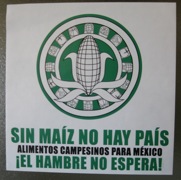

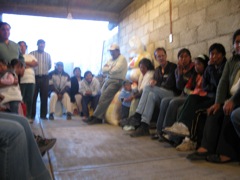
NAFTA’s Impact in Rural Communities
- In Mexico, there is a saying: “Without corn, there is no country.” Under NAFTA, tariff-free imports of subsidized corn, wheat and other agricultural products from the United States have undercut Mexican farmers’ ability to make a living. The “free trade” pact is forcing Mexican farmers who do not benefit from government subsidies to compete against transnational corporations who do. It is a clear losing proposition.
- Without the ability to sell crops at a profit, a huge percentage of Mexico’s rural population has migrated to cities, border towns and the United States looking for work. In the town we visited, approximately 40% of the younger generation has migrated within Mexico and approximately 30% has already left for the United States. This is a big change over previous generations, when most people stayed in the community.
- In the early 1990s, Mexico amended its constitution in order to initiate land reforms as a prerequisite to joining NAFTA. These reforms have lead to the privatization of farmland that was previously community-owned. Small farmers who have resisted privatization now face difficulties getting loans for fertilizer, seed and other necessities.
 “The only people that are left working in the countryside are the old people… We’re losing our roots, we’re losing our culture and we’re seeing a disintegration of the family.”
“The only people that are left working in the countryside are the old people… We’re losing our roots, we’re losing our culture and we’re seeing a disintegration of the family.”
— Gustavo Lopez Pozos, Farmer (Hear more from Gustavo)
 “Small farmers continue to produce on the land for their own consumption to survive, but it is no longer possible to gain income from the land… We have a woman here who put up her house as collateral so that she could get fertilizer to plant her land, and now the bank wants to take her house away from her.”
“Small farmers continue to produce on the land for their own consumption to survive, but it is no longer possible to gain income from the land… We have a woman here who put up her house as collateral so that she could get fertilizer to plant her land, and now the bank wants to take her house away from her.”
— Luz Rivera, Community Organizer (Hear more from Luz and others)


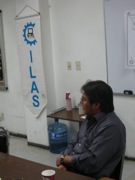


NAFTA’s Impact in Urban Communities
- In the early years of NAFTA, many of Mexico’s small and medium-sized businesses were either displaced or bought up by transnational corporations. Employees at displaced businesses were obviously out-of-work, but even many of the companies bought by international investors reduced their workforces through the introduction of new technologies.
- The influx of migrants from rural communities into the cities has created additional demand for jobs, contributing to unemployment and a reduction in real wages. Large numbers of people are now employed in the “informal economy,” selling gum on street corners, working as parking lot attendants, shining shoes and so on.
- In the early 1990s, Wal-Mart did not even exist in Mexico. Today, Wal-Mart is Mexico’s largest employer.

“We’re seeing an increase in poverty, a decrease in the purchasing power of workers’ wages, and an increase in unemployment… This is the cost of our entrance into the first world.”
— Benedicto Martinez, Labor Leader (Hear more from Benedicto)
 “I think it is the correct moment to reframe the old question about NAFTA. At the beginning of the negotiations, people would ask, ‘Which country will win under NAFTA?’ After all these years, it’s clear that this question was wrong. The question was, ‘Who will win and who will lose?’
“I think it is the correct moment to reframe the old question about NAFTA. At the beginning of the negotiations, people would ask, ‘Which country will win under NAFTA?’ After all these years, it’s clear that this question was wrong. The question was, ‘Who will win and who will lose?’
Now it’s clear that the people lost and the rich companies won.”
— Hector de la Cueva, Labor Activist (Hear more from Hector)

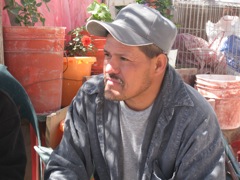

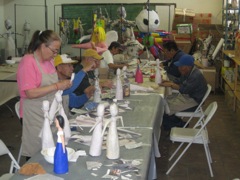

NAFTA’s Impact in Border Communities
- Under NAFTA, there has been an increase in maquiladora jobs, particularly along the border in northern Mexico. A maquiladora, or maquila, is a factory that assembles or manufactures imported materials for export to other countries. The minimum wage for this work is 54 pesos a day, which at the time of our visit was less than $4 U.S. Some maquiladoras are significant sources of pollution and expose their employees to dangerous chemicals. Many require assembly-line work prone to repetitive stress injuries.
- In order to attract additional foreign investment, the government has invested considerable revenue in state-of-the-art infrastructure for industrial parks, while largely neglecting infrastructure and other public service needs in the neighborhoods where maquiladora workers live. In one neighborhood we visited, the government already constructed a new highway to the site of a potential future industrial park, the land rights to which are still in dispute. The community living on the site have had their electricity and water shut off; their neighborhood surrounded by a fence and private security guards; and have been subject to violence and harassment highlighted in a recent Amnesty International alert.
In Ciudad Juarez, the city home to the most maquiladoras in Mexico, there are no independent labor unions. Only about 10% of the city’s maquila workers are unionized at all, and those unions are notoriously corrupt “company unions.” Real labor organizing can be dangerous in Mexico, and labor rights activists accuse the government of wanting to prevent growth in independent unions.
 “The government rightly believes that if they regulate too much, companies aren’t going to come here. They’re thinking about the tens of thousands of jobs that have been created here with the help of foreign investment, that the state would not have been able to create on its own. But they’re not thinking about the quality of the jobs that are being created.”
“The government rightly believes that if they regulate too much, companies aren’t going to come here. They’re thinking about the tens of thousands of jobs that have been created here with the help of foreign investment, that the state would not have been able to create on its own. But they’re not thinking about the quality of the jobs that are being created.”
— Martha Miker, Professor (Hear more from Martha)
 “What does a free trade agreement do for a single mother, who has to be the mother, has to be the father, has to play all of those family roles? We’re talking about fifty-four pesos a day. With only fifty-four pesos a day, this mother, who is the only bread-winner, is expected to pay for water, electricity, gas, food, education.”
“What does a free trade agreement do for a single mother, who has to be the mother, has to be the father, has to play all of those family roles? We’re talking about fifty-four pesos a day. With only fifty-four pesos a day, this mother, who is the only bread-winner, is expected to pay for water, electricity, gas, food, education.”
— Daniel, Labor Activist (Hear more from Daniel)
 “One of the things to understand is that in Mexico there are ‘ghost unions’ that exist. So, I might be a worker. Nobody is taking dues from me. Nobody is saying that they’re representing me. It’s not until the workers organize themselves and say that they want a contract, that an arbitrator will come in and say, ‘You already have a union. What’s going on here?’”
“One of the things to understand is that in Mexico there are ‘ghost unions’ that exist. So, I might be a worker. Nobody is taking dues from me. Nobody is saying that they’re representing me. It’s not until the workers organize themselves and say that they want a contract, that an arbitrator will come in and say, ‘You already have a union. What’s going on here?’”
— Angel Andasola, Labor Activist (Hear more from Angel)
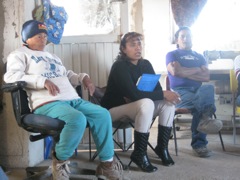
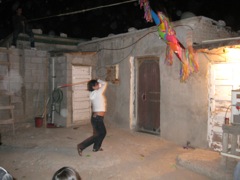
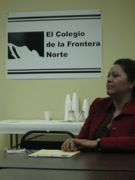
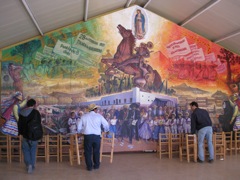

Lessons in How to Fight Back
- None of the organizations or individuals we met with put much faith in the Mexican government doing the right thing on trade. Groups that have been working on trade policy have actively reached out to allies in other countries in order to strengthen demands for change. They have also been very active in proposing alternatives to the existing trade model.
- In response to the hardship caused by NAFTA and other neoliberal policies, many organizations are directly involved in helping their members survive on a day-to-day basis. So-called “political” organizations are also direct “service providers.” In addition to making demands for public services from the state, community groups are creating their own collective projects in order to provide things like alternatives to chemical fertilizers and new sources of employment. Independent unions are not only organizing formal employees, but also those in the informal sector and those looking for housing.
- Community organizations and independent unions act boldly and militantly in the face of government, corporate and “company union” repression.
 “Free trade agreements function like transnational blackmail against workers… They’ve introduced competition between North and South workers… Since the beginning, we’ve believed that the more effective way to fight back and break this logic against working people is to bring together working people from different countries, North-to-South and South-to-South, to break the blackmail.”
“Free trade agreements function like transnational blackmail against workers… They’ve introduced competition between North and South workers… Since the beginning, we’ve believed that the more effective way to fight back and break this logic against working people is to bring together working people from different countries, North-to-South and South-to-South, to break the blackmail.”
— Hector de la Cueva, Labor Activist (Hear more from Hector)
 “We’re not talking about having a utopia, but we need to start thinking about competition in another way. At the macro-level competition sounds really good, but at the personal level it means a more precarious life.”
“We’re not talking about having a utopia, but we need to start thinking about competition in another way. At the macro-level competition sounds really good, but at the personal level it means a more precarious life.”
— Victor Hugo, Human Rights Activist (Hear more from Victor)
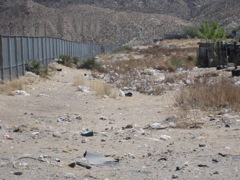

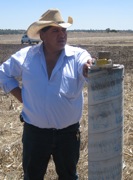
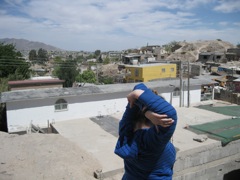
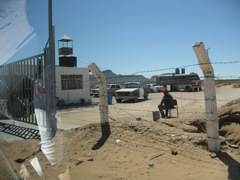
How Trade Activists in the U.S. Can Act in Solidarity
- Trade activists in the United States need to make sure they’re articulating a vision for change that goes well beyond just adding “labor and environmental standards” to the existing trade model. The two most common demands for NAFTA reform we heard in Mexico were stopping agricultural dumping and allowing developing countries to have the policy space needed to protect infant industries.
- Activists working on trade policy in Mexico asked that allies in the United States also tackle issues like debt relief and immigration policy. When we asked farmers and maquiladora workers what people in the United States can do to help, the most common response was to show immigrants hospitality.
- We also need to recognize that we often have more political freedoms, access to resources and a more responsive government than our allies in poorer nations. We should use these opportunities to stop the expansion of NAFTA into new countries and to press for its renegotiation.
 “I believe that the Mexican government will not put pressure on maquiladoras in terms of environmental issues. That’s because the businessmen, including Mexican businessmen, have very strong connections with the government and Mexican politicians. These people, too, benefited from NAFTA.”
“I believe that the Mexican government will not put pressure on maquiladoras in terms of environmental issues. That’s because the businessmen, including Mexican businessmen, have very strong connections with the government and Mexican politicians. These people, too, benefited from NAFTA.”
— Felix Perez, Environmental Activist (Hear more from Felix)
 “It is impossible to resolve environmental and labor rights if you don’t touch other parts of NAFTA.”
“It is impossible to resolve environmental and labor rights if you don’t touch other parts of NAFTA.”
— Alejandro Villamar, Trade Activist (Hear more from Alejandro)
